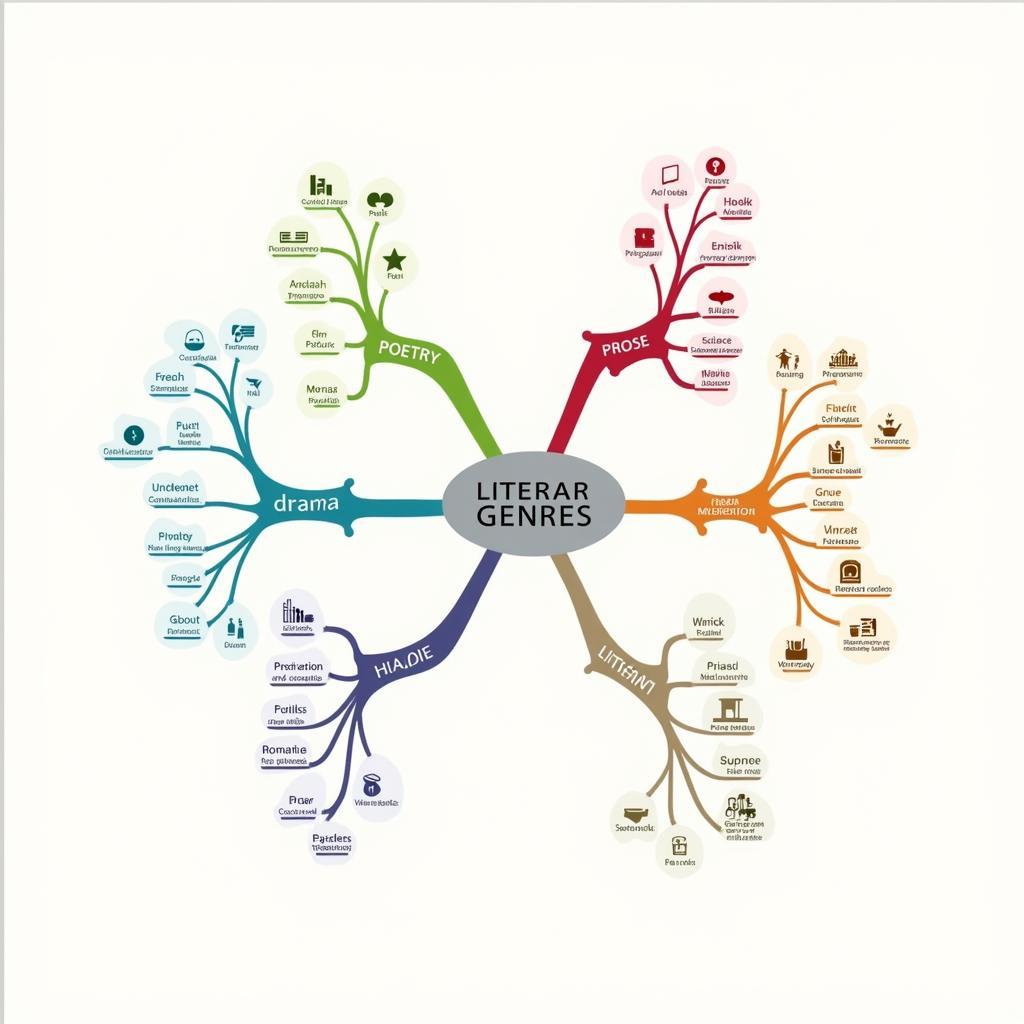Literary genres in English offer a rich tapestry of storytelling, encompassing various forms and styles. From epic poems to modern graphic novels, each genre carries its unique characteristics, appealing to different tastes and exploring diverse themes. Understanding these genres is key to appreciating the vast landscape of English literature.
Unveiling the Major Literary Genres in English
English literature boasts a wide array of genres, each with its own conventions and purposes. Let’s delve into some of the most prominent ones:
Poetry: The Art of Lyrical Expression
Poetry, one of the oldest forms of literature, uses concise, musical language to convey emotions, ideas, and experiences. From sonnets to free verse, poetry encompasses various subgenres, each with its distinct structure and rhythm. Think of Shakespeare’s sonnets, with their intricate rhyme schemes, or the flowing, unbound verses of Walt Whitman’s free verse.
Prose: Narrative at its Core
Prose, the most common form of writing, focuses on narrative and character development. This genre encompasses novels, short stories, and novellas, offering readers immersive experiences and exploring complex themes. Consider the sweeping narratives of Charles Dickens’ novels or the concise, impactful storytelling of Edgar Allan Poe’s short stories.
Drama: Bringing Stories to Life
Drama is designed for performance, with dialogue and action driving the narrative. Plays, ranging from tragedies to comedies, explore human conflicts and emotions, often with profound insights. Imagine the dramatic tension of Shakespeare’s tragedies or the witty banter of Oscar Wilde’s comedies.
Non-Fiction: Exploring the Real World
Non-fiction deals with factual information, exploring real-life events, people, and ideas. This genre includes biographies, autobiographies, essays, and documentaries, offering readers insights into the world around them. Think of the detailed accounts in historical biographies or the persuasive arguments presented in essays.
 Major Literary Genres in English
Major Literary Genres in English
Delving into Subgenres: Exploring Niches within Literary Genres in English
Within these broad categories, numerous subgenres further refine the literary landscape. For instance, within prose, we find genres like science fiction, fantasy, romance, and thriller, each catering to specific interests and employing unique narrative elements. Similarly, poetry encompasses subgenres like haiku, limerick, and epic poetry, each with its own distinct form and style.
Science Fiction: Exploring the Unknown
Science fiction delves into imaginary worlds, often exploring advanced technology, space travel, and alternative realities. This genre allows authors to speculate on the future and examine the implications of scientific advancements.
Fantasy: Embracing Magical Realms
Fantasy transports readers to magical realms, populated by mythical creatures and governed by fantastical laws. This genre often explores themes of good versus evil and the power of imagination.
Romance: Celebrating Love and Relationships
Romance focuses on the development of romantic relationships, exploring the complexities of love, passion, and commitment. This genre often evokes strong emotional responses from readers.
 Exploring Subgenres within Literary Genres
Exploring Subgenres within Literary Genres
Why Understanding Literary Genres in English Matters
Understanding literary genres provides a framework for appreciating and analyzing literature. It helps readers identify the conventions and expectations associated with different genres, enhancing their understanding of the author’s intentions and the overall meaning of the work. Moreover, knowing the characteristics of various genres allows readers to explore and discover new literary landscapes, broadening their horizons and enriching their reading experience.
Exploring Literary Styles: Beyond the Basics of Literary Genres in English
Beyond the broad classifications of genres, understanding literary styles further deepens our appreciation of English literature. Styles, such as minimalism, postmodernism, and magical realism, influence how stories are told and how themes are explored.
Conclusion: Embracing the Richness of Literary Genres in English
From the lyrical beauty of poetry to the immersive narratives of prose, literary genres in English offer a boundless world of exploration and enjoyment. By understanding the characteristics of these genres, readers can unlock a deeper appreciation for the power and artistry of storytelling. Exploring these diverse genres will undoubtedly enrich your understanding of literature and open doors to countless literary treasures.
FAQs:
- What is the difference between a novel and a novella?
- What are some common characteristics of a tragedy?
- How does free verse differ from other forms of poetry?
- What are some popular examples of science fiction literature?
- Why is understanding literary styles important?
Gợi ý các câu hỏi khác, bài viết khác có trong web:
- Các tác giả nổi tiếng trong văn học Anh
- Phân tích tác phẩm văn học Anh
Kêu gọi hành động: Khi cần hỗ trợ hãy liên hệ Số Điện Thoại: 0705065516, Email: thptquangtrung@gmail.com Hoặc đến địa chỉ: NB tổ 5/110 KV bình thường b, P, Bình Thủy, Cần Thơ, Việt Nam. Chúng tôi có đội ngũ chăm sóc khách hàng 24/7.

